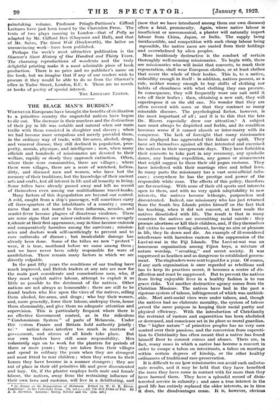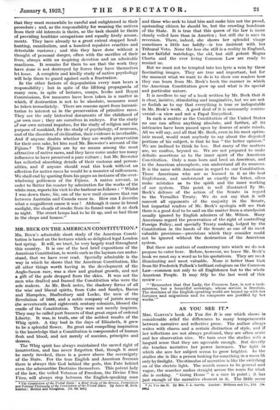THE BLACK MAN'S BURDEN.*
WHENEVER Europeans have brought the benefits of civilization to a primitive country the ungrateful natives have begun to die out. The decrease in their numbers and the destruction of their joy in life was notable and natural when our main traffic with them consisted in slaughter and slavery ; when we had become more scrupulous and merely provided them, in the ordinary way of trade, with fire-arms, alcohol, drugs, and venereal disease, they still declined in population, pros- perity, morals, physique, and intelligence ; now, when many officials and hundreds of missionaries are devoted to their welfare, rapidly or slowly they approach extinction. Often, where there were communities, there arc villages ; where there were villages, there are a score of wretched, listless, dirty, and diseased men and women, who have lost the memory of their traditions, lost the knowledge of their ancient arts and crafts, lost all interest in life and all tenacity in living. Some tribes have already passed away and left no record of themselves even among our multitudinous travel-books.
Many factors of this depopulation are beyond our control. A cold, caught from a ship's passenger, will sometimes carry off three-quarters of the inhabitants of a country ; among races that are not inured to them influenza, measles, and scarlet-fever become plagues of disastrous virulence. There are some signs that our minor endemic diseases, so savagely e?idemic at their first appearance, may in time become endemic and comparatively harmless among the survivors ; mission- aries and doctors work self-sacrificingly to prevent and to cure outbreaks of disease ; but incalculable damage has already been done. Some of the tribes we now " protect " were, it is true, moribund before we came among them ; and we have never been solely responsible for wars of annihilation. There remain many factors in which we are directly culpable.
In the past fifty years the conditions of our trading have much improved, and British traders at any rate are now for the main part considerate and conscientious men, who, if they must exploit native labour, attempt to exploit it as little as possible to the detriment of the natives. Other nations are not always as honourable : there are still to be found traders who live upon the vices of the natives, selling them alcohol, fire-arms, and drugs ; who buy their women, and, more generally, force their labour, underpay them, house them abominably, and give them no adequate attention and supervision. This is particularly frequent where there is no effective Government control, as in the ridiculous " Condominium System " of parts of Melanesia. Under this system France and Britain hold authority jointly : nei' • nation dares interfere too much in matters of government, and abuses of all kinds take place. But our own traders have still some responsibility. Men voluntarily sign on to work for the planters for periods of three or more years ; they are taken from their villages and spend in celibacy the years when they are strongest and most fitted to rear children ; when they return to their homes they have become in a manner strangers ; they are out of place in their old primitive life and grow discontented and lazy. Or, if the planter employs both male and female labour, the natives, away from the restraining influence of their own laws and customs, will live in a debilitating, and
• (I) Essays on the Depopulation of Melanesia. Edited by W; H. R. Rivers. Cambridge : of the University Press. [6s. net.]—(2) The Hill Tribes of Fiji. By a. 11. Brouster. London; Seeley, Service and Co. [EM. net.]
(now that we have introduced among them our own diseases) often a fatal, promiscuity. Again, where native labour is insufficient or uneconomical, a planter will naturally import labour from China, Japan, or India. The supply being inexhaustible, and competition with such cheap labour being mpossible, the native races are ousted from their holdings and overwhelmed by alien peoples.
More insidiously destructive is the conduct of certain thoroughly well-meaning missionaries. To begin with, there are missionaries who will insist that converts, to mark their regeneration, shall wear European clothes, or at least clothes that cover the whole of their bodies. This is, to a native, unhealthy enough in itself : in addition, natives possess, as a rule, neither money enough to buy shifts of clothing nor habits of cleanliness with what clothing they can procure. In consequence, they will frequently wear one suit until it rots off their bodies ; then, obtaining a new suit, they will superimpose it on the old one. No wonder that they are often covered with sores or that they contract so many miserable diseases. The psychological factor, however, is the most important of all ; and it is to this that the late Dr. Rivers especially drew our attention.1 A subject race must always be dispirited and feeble, and its condition becomes worse if it cannot absorb or inter-marry with its conqueror. The lack of foresight that many missionaries have displayed has aggravated this failure of spirit. They have set themselves against all that interested and exercised the natives in their unregenerate days. They have forbidden their converts to take part in any ceremony, any symbolic dance, any hunting expedition, any games or amusements that might suggest to them their old pagan customs. They have interfered with their marriage rites and tribal laws. In many parts the missionary has a vast semi-official influ- ence ; everywhere he has the prestige and power of the responsible white man. The effects of this policy, therefore, are far-reaching. With none of their old sports and interests open to them, and with no very quick adaptability to new interests, the natives become lethargic, purposeless and discontented. Indeed, one missionary who has just returned from the South Sea Islands prides himself on the fact that his teaching, when it did not convert, at least made the natives dissatisfied with life. The result is that in many countries the natives are committing racial suicide : they procure abortions or kill their children, and, if they themselves fall victim to some trifling ailment, having no aim or pleasure in life, they lie down and die. An example of ill-considered interference with harmless custom is the suppression of the Luvi-ni-wai in the Fiji Islands. The Luvi-ni-wai was an innocuous organization among Fijian boys, a mixture of nature worship, " scouting," and secret society. It was suppressed as heathen and as dangerous to established govern. ment. The ringleaders were sent to gaol for a year. Of course, if any such organization is once regarded as rebellious and has to keep its practices secret, it becomes a centre of dis- affection and must be suppressed. But to prevent the natives from living enjoyable lives in a healthy fashion is to run grave risks. Yet another destructive agency comes from the Christian Missions. The natives have had in the past a rigorous system of taboos, infringement of which was unthink- able. Most anti-social vices were under taboos, and, though the natives had no elaborate morality, the system of tabooe served the same purpose in keeping their racial purity and physical efficiency. With the introduction of Christianity the restraint of custom and superstition has been abolished or decreased, and conscience set in its place as moral guardian. The " higher nature " of primitive peoples has no very sure control over their passions, and the conversion from supersti- tion to Christianity has often meant that a native has found himself freer to commit crimes and abuses. There are, in fact, many eases in which a native has become a convert in order to escape a taboo on intoxicants, a taboo on marriage within certain degrees of kinship, or the other healthy ordinances of traditional race-preservation.
It is difficult to see low missionaries can avoid such unfortu- nate results, and it may be held that they have benefited the races they have come in contact with far more than they have harmed them. They have a splendid record of disin- terested service in calamity ; and once a true interest in the good life has entirely replaced the older interests, as in time it does, the disadvantages cease. It is, however, obvious that they must meanwhile be careful and enlightened in their procedure ; and, as the responsibility for weaning the natives from their old interests is theirs, so the task should be theirs of providing healthier occupations and equally lively amuse- ments. They have already to a great extent stopped head- hunting, cannibalism, and a hundred repulsive cruelties and detestable customs ; and this they have done without a thought of personal danger, often with the sacrifice of their lives, always with an inspiring devotion and an admirable manliness. It remains for them to see that the work they have done is not destroyed by forces they have themselves let loose. A complete and kindly study of native psychology will help them to guard against such a frustration.
In the other factors of depopulation every man bears a responsibility ; but in spite of the lifelong propaganda of many men, in spite of lectures, essays, books and Royal Commissions, few measures have been taken in a matter in which, if destruction is not to be absolute, measures must be taken immediately. There are reasons apart from humani- tarian to interest us in the preservation of primitive races. They are the only historical documents of the childhood of our own race ; they are ourselves in embryo. For the study of our own natural impulses, for the study of religion and the purpose of mankind, for the study of psychology, of neuroses, and of the disorders of civilization, their evidence is invaluable. And if anyone doubts whether they are worth preservation for their own sake, let him read Mr. Brewster's account of the Fijians? The Fijians are by no means among the most attractive of native races, and they have come under too many influences to have preserved a pure culture ; but Mr. Brewster has collected absorbing details of their customs and person- alities, and if anyone should read this book without an affection for native races he would be a monster of callousness. We shall end by quoting from his pages an instance of the over- whelming politeness of the Fijians. A native servant, in order to flatter his master by admiration for the works of the white man, reports his visit to the harbour as follows : " Whilst I was down there, Sir, one of the new mail steamers that run between Australia and Canada came in. How can I describe what a magnificent canoe it was ! Although it came in broad sunlight, the clouds of smoke from its funnel made it as dark as night. The street lamps had to be lit up, and so had those in the shops and houses."



















































 Previous page
Previous page